
Pan-Roasted Salted Chestnuts Recipe

When chestnuts are in season, this Salted Chestnuts recipe is an ideal way to use them. Chestnuts have a wonderful sweetness and nuttiness, and are shiny and brown in color. The benefits of roasting chestnuts in salt is that it shields the chestnuts from the direct heat on the stove, allowing them to stay moist. These chestnuts are wonderful served on their own as a snack but they could also be added to other dishes such as salads, soup, pasta, confections, and cakes.
To make salted chestnuts, you cut along the base of them with a knife and soak them in water. Then, they get cooked on top of a bed of salt in a covered pan until steamed for 25 minutes. Once done, the chestnuts can be served for a nutritious and flavorful snack.
What are Salted Chestnuts?
Chestnuts are a common food in both Europe and Asia, and can be enjoyed on their own or in different dishes such as soups, stir-fries, salads, pastas, and desserts. They need to be pre-cooked before eating them, which is why roasting them is so common. These salted chestnuts take the cooking process to new heights as it involves cooking the chestnuts on a bed of coarse salt in a pan on the stove. The salt seasons the chestnuts while also acting as a cushion between the chestnuts and the heat on the stove. If you can’t roast your chestnuts over a fire during the holiday season, this is the next best option.
Pro Tips
- Don’t forget to soak the chestnuts before cooking them as this will ensure that the skin softens, making the chestnuts easy to peel.
- Scoring the chestnuts is an important step as it will help you peel them easily when you are ready to eat them.
- It is best to peel the chestnuts while they are still warm but not too hot to handle. Once they cool, they will be more difficult to peel.
- Once cooked, you can season them with salt and pepper or other seasonings before enjoying them.
- Make sure the pan you cook the chestnuts in has a tight-fitting lid to ensure that the steam is locked in.
- If your pan doesn’t have a lid, you could also cover it tightly with foil.
What to Serve with Salted Chestnuts?
A common Christmas tradition, these salted chestnuts can be served in a bowl alongside other Christmas snacks such as cookies and confections. They are also wonderful in other dishes such as Brussels sprouts, stir-fries, cakes, and pastas.
Should Chestnuts Be Cooked?
Yes, chestnuts should always be cooked before you eat them as they can cause digestive discomfort otherwise. This is due to high levels of tannic acid.
How Can I Choose the Best Chestnuts?
When you are shopping for chestnuts, look for ones that seem heavy for their size and have a glossy exterior and tough skin. Less fresh chestnuts will likely have a paler appearance.
What is the Purpose of Scoring the Chestnuts?
Scoring has a few different purposes. It helps make the chestnuts easier to peel once they are cooked, and most importantly, it helps steam escape from the chestnuts so they don’t explode during the cooking process.
Why Are My Chestnuts Still Hard, Even Though I Roasted Them?
Chestnuts can remain hard after roasting if they’re not properly soaked, scored, or cooked. Insufficient soaking means they don’t absorb enough moisture to soften, while shallow cuts prevent steam from escaping for even cooking. Additionally, stale chestnuts, uneven heat, or too short a cook time can also result in hardness. Ensuring fresh chestnuts, proper soaking, and extended cooking time can help.
How to Store Salted Chestnuts
These salted chestnuts can be stored in an airtight container in the fridge for 1 day. However, if you would like to store them for longer, you could also freeze them in a sealable bag in the freezer. The coarse salt can be reused for another use.
Ingredients
How to Make Salted Chestnuts
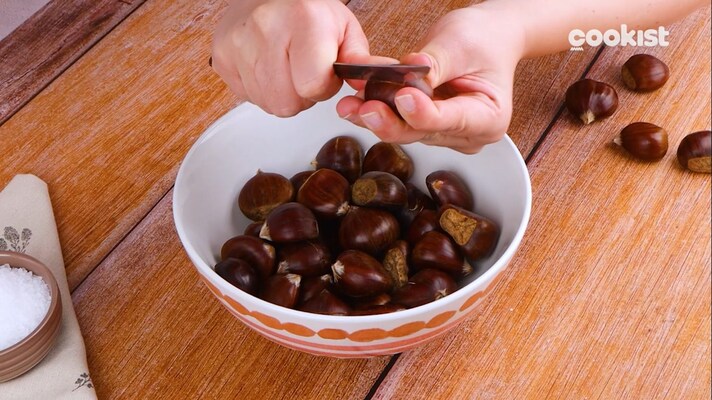
Score the chestnut skins with a knife.
Score the chestnut skins with a knife.
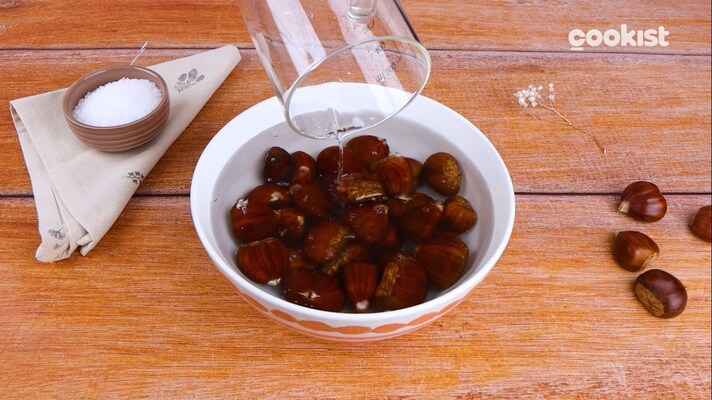
Place the chestnuts in a bowl, cover them with water, and allow them to soak for 30 minutes. Once soaked, drain the chestnuts and pat them dry.
Place the chestnuts in a bowl, cover them with water, and allow them to soak for 30 minutes. Once soaked, drain the chestnuts and pat them dry.
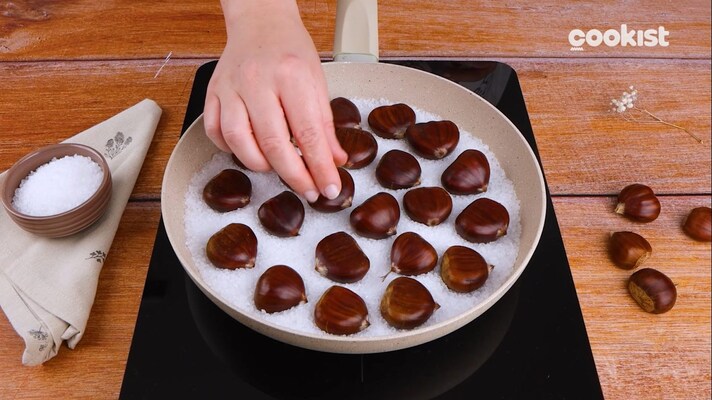
Pour the salt in a pan, ensuring it evenly covers the base. Place the chestnuts on the salt with the cut sides facing down.
Pour the salt in a pan, ensuring it evenly covers the base. Place the chestnuts on the salt with the cut sides facing down.
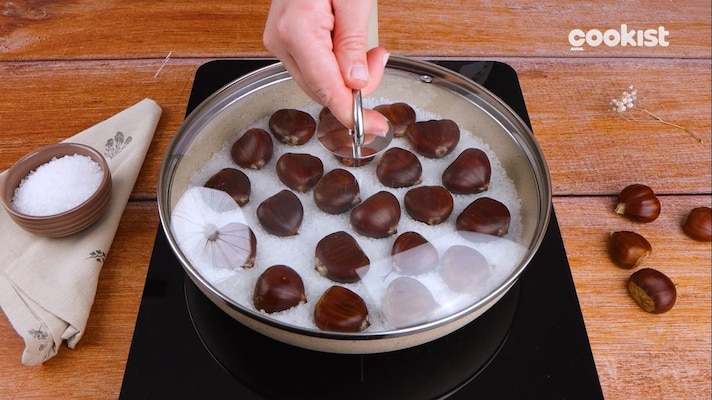
Cover the pan with a lid and allow them to cook for 25 minutes.
Cover the pan with a lid and allow them to cook for 25 minutes.
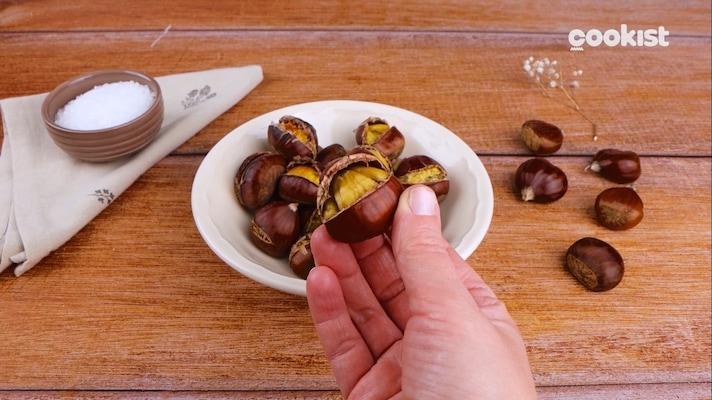
Serve the chestnuts in a bowl and enjoy!
Serve the chestnuts in a bowl and enjoy!
;Resize,width=767;)



